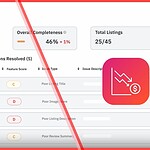Hospitable Adds New Layer of Protection for Hosts with ‘Automated Security Deposit’ Feature
- Hospitable has introduced a new automated Security Deposit feature that combines three core components: deposit collection, guest ID verification, and chargeback protection.
- All three are now bundled directly into the platform, without requiring third-party tools or manual steps.
- Here’s what’s new: Once a reservation is confirmed, the system automatically requests and holds a deposit, verifies the guest’s ID before check-in, and releases funds after checkout.
- If a guest fails to complete the deposit or ID verification, check-in instructions are withheld. If damage occurs, hosts can file a charge request from their inbox, with most resolved within a day. Chargeback protection is also included.
- The deposit workflow runs in the background and is priced at a flat 2% per deposit. Hospitable aims to streamline what’s typically a fragmented process and reduce the risk hosts take on when deposits aren’t enforced or are hard to claim.
About Hospitable
Hospitable is a tool that simplifies short-term rental management by automating tasks like guest communication, scheduling, and managing listings on platforms such as Airbnb, Booking.com, and Vrbo. Hospitable also offers features for creating direct booking websites and integrates with Google Vacation Rentals for more booking opportunities.
Snigdha’s Views
- Hospitable’s new feature tackles a familiar challenge: security deposits are often skipped, not because hosts don’t want them, but because collecting and enforcing them has traditionally required awkward, manual steps or third-party workarounds.
- By building deposit collection, guest ID verification, and chargeback protection directly into its platform, Hospitable is removing friction for hosts but not entirely for guests.
- Adoption will likely hinge on how seamless and transparent the process feels on the guest side, especially for direct bookings.
- Last year, Hospitable launched its “Abandoned Bookings” tool to recover lost revenue and partnered with Touch Stay to automate guidebook sharing through its AI messaging.
- Taken together, these updates reflect Hospitable’s aim to tighten up key parts of hosting, without requiring hosts to piece together third-party tools.
Whimstay Opens Platform to Independent Hosts, Lowering Barriers to Tackle Vacancy Gaps
- Whimstay, a platform focused on last-minute vacation rental bookings, has opened its doors to independent hosts for the first time.
- Previously, only property managers using one of 22 PMS integrations could list on Whimstay.
- Now, hosts can join the platform by linking their existing Airbnb listings, automatically importing details and syncing calendars, making onboarding faster and more accessible.
- Whimstay’s model is built around last-minute deals, targeting guests booking within a 30-day window. By expanding supply to include individual hosts, the platform is looking to increase listing volume during periods when many rentals go unbooked.
About Whimstay:
Whimstay is a last-minute booking platform designed to help short-term rental operators fill vacant nights, particularly during slower periods. Originally built for professional property managers through integrations with 20+ PMS systems, it offers discounted rates to spontaneous travelers while giving operators a low-commission, non-exclusive channel to boost occupancy.
Snigdha’s Views
- By opening up to independent hosts, the platform is expanding beyond its original focus on professional property managers and aiming to capture a much broader slice of the short-term rental market.
- Platforms are looking for new ways to increase supply, particularly of available inventory during low-demand periods.
- The Airbnb sync and no-exclusivity model lowers the barrier to entry and reduces friction, especially for hosts who may not be tech-savvy or don’t use a full property management system.
- This simplicity can be appealing for smaller operators trying to make up for last-minute vacancies, which remain one of the most stubborn challenges in STRs.
- Managers who are already listed with Whimstay may benefit from the platform’s increased visibility and expanded inventory, but they’ll also need to continue differentiating on service quality and guest experience, as the platform now brings in many new independent players.
Casago Taps Streamline to Power 40,000-Property Network Post-Vacasa Acquisition
- Streamline (part of Inhabit) has officially deepened its relationship with Casago, becoming the primary property management system (PMS) for Casago and Vacasa’s combined 40,000-property portfolio.
- While not a new relationship, this strategic expansion formalizes Streamline’s role as the platform of record for Casago’s growing franchise network, including properties previously managed by Vacasa.
- The two companies have worked together for years, with Streamline powering a significant portion of Casago’s tech stack behind the scenes.
About Streamline
Streamline is a property management software solution developed specifically for the vacation rental industry. It was one of the early platforms built by professionals with experience in managing short-term rentals. Now part of the Inhabit ecosystem, Streamline supports a wide range of operational functions, from guest communication and booking management to revenue optimization and team coordination.
Snigdha’s Views
- Casago is wasting no time retooling its operations post-Vacasa acquisition. Recently, Casago also partnered with Guesty HQ, and now, with Streamline handling core PMS infrastructure, the pieces are falling into place for a more integrated, operator-friendly platform.
- Casago appears to be taking a more modular approach by partnering with tech providers rather than building everything in-house like Vacasa’s former all-in-one, build-everything-internally model.
- Casago is promoting an “ownership-first” culture across its franchises, and that likely means giving operators more say in how tools are used, configured, and scaled.
- For Streamline, this is a visibility win. It takes them from being a trusted PMS among growing operators to now powering a portfolio that includes one of the biggest names in the industry.
- For property managers watching this unfold, there’s a broader lesson here: the importance of aligning with tech partners who can scale with you, adapt to market changes, and support long-term ambitions.
Snigdha Parghan is a Content Marketer at RSU by PriceLabs, where she creates articles, manages daily social media, and repurposes news and analysis into podcasts and video content for short-term rental professionals. With a focus on technology, operations, and marketing, Snigdha helps property managers stay informed and adapt to industry shifts.








